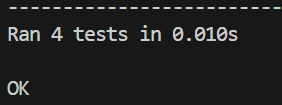Understanding Unit Testing in Python: Testing Laundry Price Calculations
 Muhammad Abdiel Al Hafiz
Muhammad Abdiel Al Hafiz
What is Unit Testing?
In the world of software development, ensuring that your code works correctly is crucial. This is where unit testing comes into play. Unit testing is a type of software testing where individual units or components of the software are tested. The primary goal is to validate that each unit of the software performs as expected.
Unit testing helps developers identify and fix bugs early in the development process, which can save time and reduce costs. Additionally, it makes the codebase more maintainable and reliable, leading to higher-quality software.
In this article, we'll explore the basics of unit testing in Python using the unittest library. To make it more practical, we'll walk through a real-world example: testing the calculation of laundry prices. This project involves creating a function to calculate the total cost of laundry based on the weight of the clothes and the price per kilogram. By the end of this article, you’ll have a solid understanding of how to implement and run unit tests in Python, ensuring your functions work correctly and efficiently.
About Laundry Price Calculations
In our daily lives, many of us rely on laundry services to save time and effort. Typically, the cost of these services is calculated based on the weight of the clothes and a fixed price per kilogram. To automate and simplify this calculation, we can write a Python function that takes the weight of the laundry and the price per kilogram as inputs and returns the total cost.
This project aims to create a reliable function for calculating laundry prices and ensure its accuracy through unit testing. By doing so, we can avoid potential errors and guarantee consistent results, which is especially important for businesses relying on precise cost calculations.
Business Rules
As a business in general, of course, laundry seeks profit. In this project, we will define some business rules to get closer to what happens in the real world.
Minimum order is 3kg.
Orders under 3kg will be counted as a minimum order (3kg).
Only Complete Express and Speedy Express packages are available for orders under or equal to 1 day.
There will be 4 packages:
| Package Name | Price/Kg | Processing Time (Day) |
| Folded Dry Cleaning | Rp7000 | 3 |
| Folded Dry Cleaning | Rp8500 | 2 |
| Iron Dry Cleaning | Rp10000 | 3 |
| Iron Dry Cleaning | Rp12000 | 2 |
| Complete Express | Rp15000 | 1 |
| Speedy Express | Rp25000 | 0.2083 (5 Hours) |
No need to be confused for packages with the same name, they are still the same package, it's just that the price and duration of work are different.
The Logic
The logic is quite simple, the program calculates the total price to be paid based on the quantity of laundry (kg) and the price of the laundry package.
Example
| Package Name | Quantity (Kg) | Processing Time (Day) | Total Price (Rp) |
| Folded Dry Cleaning | 4 | 2 | 34000 |
| Complete Express | 2 | 1 | 30000 |
| Folded Dry Cleaning | 2 | 3 | 21000 |
| Iron Dry Cleaning | 5 | 4 | 50000 |
| Speedy Express | 3 | 0.2083 | 75000 |
| Iron Dry Cleaning | 4 | 2 | 48000 |
Now it's Time to Code
Setting Up the Environment
Ensure you have Python installed from python.org.
Use an IDE like PyCharm or VS Code for coding.
hargaBayar.py
Create a file with name hargaBayar.py.
Here is the code for the class that calculates laundry prices:
""" Description mko = Minimum Kilogram prk = Price Per Kilogram dy = Day tpy = Total Pay pkg = Package desc = Package Name Package options: 1. Folded Dry Cleaning 2. Iron Dry Cleaning 3. Complete Express 4. Speedy Express """ class calcPayment: def __init__(self, pkg, ko, dy): self.pkg = pkg self.ko = ko self.dy = dy self.desc = None def countTotal(self): mko = 3.00 prk = 0.00 tpy = 0.00 ## Package calculations (1) Folded Dry Cleaning if self.pkg == 1: self.desc = "Folded Dry Cleaning" prk = 7000.00 if self.dy < 3: if self.dy > 1: prk = 8500.00 if self.ko < mko: self.ko = mko elif self.dy < 2: raise ValueError("Folded Dry Cleaning at the earliest 2 days") else: if self.ko <= 3: self.ko = mko tpy = prk * self.ko ## Package calculations (2) Iron Dry Cleaning elif self.pkg == 2: self.desc = "Iron Dry Cleaning" prk = 10000.00 if self.dy < 3: if self.dy > 1: prk = 12000.00 if self.ko < mko: self.ko = mko elif self.dy < 2: raise ValueError("Iron Dry Cleaning at the earliest 2 days") else: if self.ko <= 3: self.ko = mko tpy = prk * self.ko ## Package calculations (3) Complete Express in 1 day elif self.pkg == 3: self.desc = "Complete Express" self.dy = 1 prk = 15000.00 if self.ko < mko: self.ko = mko tpy = prk * self.ko ## Package calculations (4) Speedy Express in 5 hours elif self.pkg == 4: self.desc = "Speedy Express" prk = 25000.00 self.dy = 0.2083 tpy = prk * self.ko print("Note:") print("1. Orders under 3 kilograms will be counted as a minimum order (3kg).") print( "2. Only Complete Express and Speedy Express packages are available for orders under or equal to 1 day." ) print("\nHere is Your Payment") print(f"Package: {self.desc}") print(f"Quantity: {self.ko} Kilogram") print(f"Processing time: {self.dy} Day") print(f"Total Payment: Rp{tpy}") print("\nThank You for Ordering") return ( tpy # You can change this to a blank string when you not doing unit testing ) # Test the calculation order = calcPayment(4, 4, 1) # calcPayment(package, quantity, processing time(day)) print(order.countTotal())Writing Unit Testing
To ensure our
calcPaymentclass works correctly, we need to write unit tests using theunittestlibrary. Here's how to do it:Create file with name test_hitung_harga.py
import unittest import sys # Adjust path according the file location sys.path.append( "Your\Path" # Example "C:\Coding\Unit Testing" ) from laundryCode.hitungHarga import calcPayment class TestCalculations(unittest.TestCase): def setUp(self): self.tp1 = calcPayment(1, 2, 5) self.tp2 = calcPayment(2, 5, 3) self.tp3 = calcPayment(3, 5, 1) self.tp4 = calcPayment(4, 4, 1) def test_calculation_FDC(self): self.assertEqual(self.tp1.countTotal(), 21000.0, "Incorrect calculation") def test_calculation_IDC(self): self.assertEqual(self.tp2.countTotal(), 50000.0, "Incorrect calculation") def test_calculation_CEP(self): self.assertEqual(self.tp3.countTotal(), 75000.0, "Incorrect calculation") def test_calculation_SEP(self): self.assertEqual(self.tp4.countTotal(), 100000.0, "Incorrect calculation") if __name__ == "__main__": unittest.main(buffer=True) # Ignore text from classThis test suite covers various scenarios for each package type, ensuring that the
calcPaymentclass handles different inputs correctly.Run the Program
Run the program with your terminal or IDE.

Well, LGTM!
Source Code
You can see the source code here.
Conclusion
Unit testing is an essential practice in software development. It helps ensure the accuracy and reliability of your code by identifying bugs early in the development process. By implementing unit tests for our calcPayment class, we can confidently calculate laundry prices and handle various input scenarios without errors.
I hope this guide has provided you with a clear understanding of how to write and run unit tests in Python. Happy coding!
👋 Hello, I’m Abdiel, 1st Year Informatics Student, Programmer, and Freelancer.
🥰 If you liked this article, consider sharing it.
Subscribe to my newsletter
Read articles from Muhammad Abdiel Al Hafiz directly inside your inbox. Subscribe to the newsletter, and don't miss out.
Written by

Muhammad Abdiel Al Hafiz
Muhammad Abdiel Al Hafiz
Passionate about developing AI-driven solutions that make a real-world impact. DBS Foundation Coding Camp Scholarship recipient, currently advancing my skills from beginner to expert level in Machine Learning Engineering. Open to collaborations and opportunities that will challenge me to grow and contribute to innovative AI solutions.